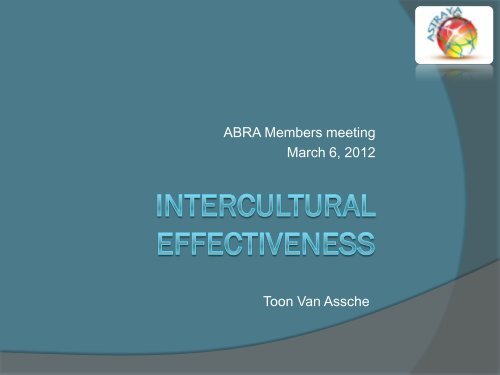Target setting linked with Bonus scheme
Target setting linked with Bonus scheme
Target setting linked with Bonus scheme
You also want an ePaper? Increase the reach of your titles
YUMPU automatically turns print PDFs into web optimized ePapers that Google loves.
ABRA Members meeting<br />
March 6, 2012<br />
Toon Van Assche
6 March 2012<br />
Culture Shock<br />
<br />
<br />
Common for even the most flexible people to endure a<br />
period of stress on their first expatriate posting to<br />
unfamiliar country.<br />
This psychological condition is the primary cause of<br />
expatriate failure. On-the-job performance can be<br />
dramatically reduced or the posting can be abandoned<br />
altogether.
6 March 2012<br />
Reverse Culture Shock<br />
<br />
<br />
<br />
<br />
Reverse culture shock when going back may come as<br />
a complete surprise.<br />
See their homeland and its place in the world in a<br />
totally different way.<br />
Why does this happen?<br />
Reverse cultural shock may manifest in unexpected<br />
feeling of disconnectedness for some of the following<br />
reasons:<br />
• Unrealistic perception of home country.<br />
• Lack of excitement.<br />
• Social isolation.<br />
• Restlessness.<br />
“Marginals”
6 March 2012<br />
Let’s take some distance<br />
What is a Culture ?<br />
Cultural models
Starting from the definition
6 March 2012<br />
What is Culture – Definition<br />
Culture is the way in which a group of people solves problems<br />
Culture has same root as “to Cultivate”<br />
The way people act upon nature<br />
E.Schein<br />
F.Trompenaars<br />
<br />
<br />
Culture in Layers<br />
Mostly implicit<br />
• Common solution – from consciousness to basic assumption<br />
• Holding your breath makes you think about the need for oxygen
Culture in layers<br />
6 March 2012
6 March 2012<br />
Acquiring a culture<br />
3 levels that shape cultural identity<br />
Specific to individuals<br />
Inherited and Education<br />
personality<br />
Specific to groups<br />
culture<br />
Education<br />
Universal<br />
human nature<br />
Inherited<br />
Mental Programming
6 March 2012<br />
Cultural differences<br />
Attitude to the environment<br />
• Example Sony walkman<br />
Culture as a dual “normal distribution”<br />
• Individuals versus the average culture<br />
○ Regional differences <strong>with</strong>in country<br />
○ Educational differences<br />
○ Own experiences – travel to other countries/cultures<br />
○ Personality – openess & tolerance<br />
• Distribution of Norms and Values<br />
○ Two possible reactions and behaviour :
6 March 2012<br />
Stereotyping<br />
Using extreme, exaggerated forms of behaviour<br />
Registering what surprises us<br />
- Limited view of the average behaviour in a certain environment<br />
- Onion model – quick reactions on explicit cultural symbols
6 March 2012<br />
Understanding<br />
<br />
<br />
Looking at similarities, understanding the differences<br />
The average norms differs – seen as most predictable<br />
behaviour
6 March 2012<br />
Intercultural Effectiveness<br />
Start <strong>with</strong> your own cultural passport<br />
• Cultural Mirror<br />
• From this knowledge look at similarities and<br />
differences in other cultures<br />
• Anticipate<br />
Use framework to quantify<br />
• Cultural model – dimensions<br />
• No culture is right or wrong
Trompenaars Model<br />
23 Sept 2011
6 March 2012<br />
Universalism vs Particularism<br />
Universalistic Cultures<br />
• General rules, standards > particular needs<br />
• Codes, common values > claims of friends<br />
• Rules apply equally to whole “universe”<br />
• Religious background – universalist more<br />
common in Protestant cultures<br />
Particularistic Cultures<br />
• Human friendship<br />
• Intimate relationships<br />
• “Spirit of the law” > “Letter of the law”
6 March 2012<br />
Individualism vs Collectivism<br />
Individualistic culture<br />
• Each one of us is born alone<br />
• The individual before the community<br />
• Individual happiness, fulfillment, and welfare<br />
• Community how serving the interest of individual<br />
members<br />
Communitarian or Collective culture<br />
• Each one of us is born into a family, a neighborhood,<br />
a community<br />
• The community before the individual<br />
• Individual to act in ways which serve society<br />
• Individual how serving the interest of the<br />
community
6 March 2012<br />
Affective vs Neutral<br />
Affective Culture<br />
• Display of emotions<br />
• Not necessary to hide feelings<br />
• Less explicit signals are less important<br />
Neutral Culture<br />
• Incorrect to show feelings expressively<br />
• Feelings are accepted, but when in control<br />
• Louder signals seen as over-emotional, excited<br />
• Over-emotion can erode power to interest people
6 March 2012<br />
Specific vs Diffuse<br />
Specific Culture<br />
• All starts <strong>with</strong> elements – analyzed separately<br />
• Whole is sum of the parts – life is divided into many<br />
components<br />
• Easily accepted in public sphere – difficult in private<br />
sphere<br />
• Concentrate on hard facts, standards, contracts<br />
Diffuse Culture<br />
• Start <strong>with</strong> the whole – all elements related<br />
• The whole is more then the sum of the elements<br />
• Large private sphere, small public sphere<br />
• No separation of different roles for one person<br />
• Values : style, trust, understanding
6 March 2012<br />
Examples<br />
How to get to the point<br />
Emotional Quadrant<br />
Affective<br />
LOVE – HATE<br />
Latin, Arab,<br />
LatAm, S-<br />
Europe<br />
SYMPATHY -<br />
OUTRAGE<br />
USA (West),<br />
Canada<br />
Diffuse<br />
Specific<br />
DEEP RESPECT/<br />
ESTEEM -<br />
DISRESPECT<br />
Japan, SE Asia,<br />
East Africa<br />
APPROVAL -<br />
DISAPPROVAL<br />
USA (East),<br />
Scandinavia, N-<br />
Europe<br />
Neutral
6 March 2012<br />
Achievement vs Ascription<br />
Achievement Culture<br />
• What an individual does and has accomplished<br />
• Status derives from accomplishment<br />
• Achieved status to be proven over and over again<br />
Ascription Culture<br />
• Status refers to what a person is<br />
• How do other relate to his/her position in the<br />
community, society or organization<br />
• Status derived from birth, gender or wealth<br />
• Ascribed status not required to achieve to retain<br />
status
6 March 2012<br />
Sequential vs Synchronic<br />
Sequential Time<br />
• One thing at a time<br />
• Narrow line of distinct, consecutive segments<br />
• Time is tangible and divisible<br />
• Planning and keep to timing<br />
• Time commitments taken seriously<br />
Synchronic Time<br />
• Several things at a time<br />
• Allowing many things to take place simultaneously<br />
• Time is flexible and intangible<br />
• Time commitments are desirable, not absolute<br />
• Plans are easily changed<br />
• Value of satisfactory completion of interaction
6 March 2012<br />
Internal vs External Control –<br />
“relations <strong>with</strong> nature”<br />
<br />
<br />
Internalistic<br />
• Mechanistic view of nature<br />
• Nature is a complex machine – can be controlled <strong>with</strong> right<br />
experience<br />
• No believe in luck or predestination<br />
• Take advantage of opportunities to live life you want –<br />
“inner-directed”<br />
• One can dominate nature if effort is made<br />
External Control<br />
• Organic view of nature<br />
• Mankind is one of nature’s forces – operate in harmony <strong>with</strong><br />
environment<br />
• Not possible to shape own destiny<br />
• Actions are “outer-directed” – adapted to external<br />
circumstances
6 March 2012<br />
Halls’s Dimension’s<br />
High Context<br />
Strong social bonds<br />
Social hierarchy governs<br />
communication<br />
Communication builds connection<br />
Avoidance of direct confrontation<br />
Low Context<br />
High individualism<br />
Little social hierarchy observed<br />
Communication is explicit and<br />
impersonal<br />
Comfortable <strong>with</strong> open confrontation
Communication<br />
6 March 2012
6 March 2012<br />
How to give instructions?<br />
<br />
Low context / Explicit<br />
<br />
High context / Implicit<br />
• Instructions spelled out to<br />
minute details<br />
• Instructions not spelled out<br />
(assumed one knows)
6 March 2012<br />
Questions?<br />
www.astraya.eu



